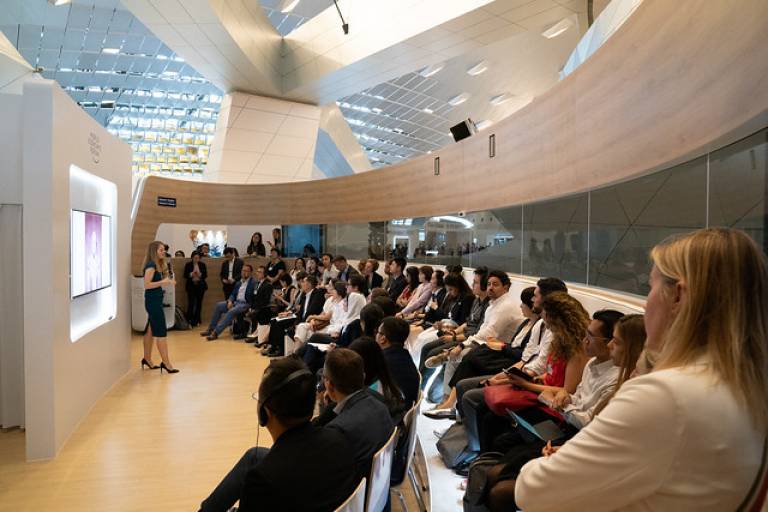Mental health in the spotlight at World Economic Forum Annual Meeting
22 July 2019
Faculty of Brain Sciences researchers recently attended the Annual Meeting of the New Champions 2019, leading the discussion on the future of mental health research.

The World Economic Forum Annual Meeting of the New Champions 2019 – Leadership 4.0: Succeeding in a New Era of Globalization was held in Dalian, China 1-13 July 2019.
The Annual Meeting of the New Champions is designed as the foremost global summit on innovation and entrepreneurship around the biggest challenges facing society today. One such challenge is mental health.
UCL was approached for its innovative research into mental health, with UCL speakers presenting at the meeting, including, Dr Susanne Schweizer (Institute of Cognitive Neuroscience), Dr Joseph Hayes (Division of Psychiatry) and Dr Rick Adams (Institute of Cognitive Neuroscience).
Wellcome Trust Clinical Research Career Development Fellow, Dr Joseph Hayes, presented on better uses of electronic health records for research into mental health, and what is possible when these records are paired with machine learning/artificial intelligence approaches.
“Poor mental health or mental illness is a growing problem globally. Research into mental health has been underfunded relative to the rest of medicine and there is still considerable stigma associated with mental health problems.
“We desperately need to develop our understanding of the causes of mental health problems, effective treatments and potential outcomes,” said Dr Hayes.
Dr Rick Adams spoke about the fact that many psychiatric researchers are dissatisfied with current ways of classifying mental disorders based only on symptoms. He suggested that one way to improve the classification is the use computational models of brain imaging data to look for complex ‘signatures’ of dysfunction of specific cell types in these data.
“The burden of mental disorders is massive: probably the biggest disease burden of early adult life, as they are very common and usually start when people are young, and can last a lifetime,” said Dr Adams.
Dr Susanne Schweizer discussed the inadequacy of current care provision for mental health problems in young people worldwide and the urgent need to develop new and accessible interventions.

“Mental health problems are now one of the leading causes of disability in young people, and 75% of all mental health problems arise before the age of 24. For many these disorders will remain recurrent across the lifespan, but we currently lack accessible and effective interventions,” said Dr Schweizer.
“We therefore developed a cognitive training app that trains one of the basic cognitive building blocks of emotion regulation and the brain regions it relies on. We showed that people who used the training significantly improved their ability to regulate the brain regions it relies on,” she added.
Director & Sackler Chair, UCL Institute of Mental Health, Professor Anthony David said the conference was a great opportunity to “showcase our research to some of the world’s most influential movers and shakers”.
“The newly established ‘Institute of Mental Health’ became the catalyst to bring together some of our most up-and-coming researchers who together were perfectly placed to convey the spectrum of new research at UCL.
“I was therefore delighted that Rick, Susanne and Joe were able to represent the Institute – with their cutting-edge work on computational psychiatry and neurophysiology; cognitive neuroscience in adolescence; and ‘big data’ epidemiology in mental health. Such a unique and exciting program!”
Links
- Joseph Hayes
- Division of Psychiatry
- Rick Adams
- Susanne Schweizer
- Institute of Cognitive Neuroscience
- UCL Institute of Mental Health
- Professor Anthony David
- World Economic Forum Annual Meeting
 Close
Close

